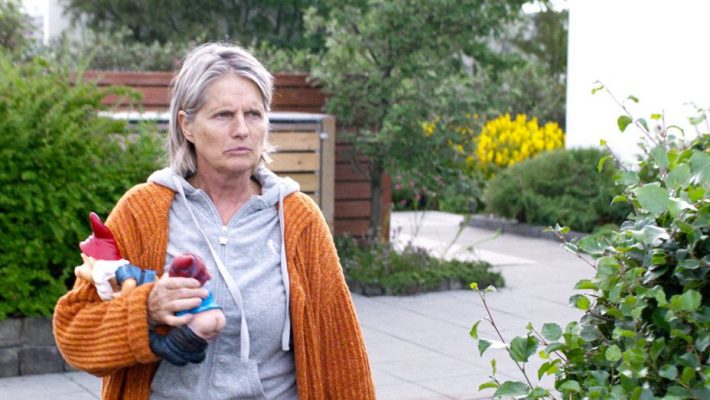In cinema from Fri 10 Aug 2018
It’s not surprising that Scandinavian cinema has tended towards the chilly, but few films have such an icicle as Under the Tree. Ostensibly a black comedy, any laughs elicited are often strangled by squawks of shock as director Sigurðsson takes a bleak, tragic turn with this ever-escalating satire on the squabbles of petty suburbanites.
After being caught watching home-made porn he made with an ex-girlfriend, Atli (Steinþór Hróar Steinþórsson) is turfed out of his marital home and moves back in with his parents, just in time to witness the escalation of tensions over the huge tree in their back garden. Inga (Edda Björgvinsdóttir) has become embittered since the disappearance and presumed death of her other son, a state that ineffectual husband Baldvin (Sigurður Sigurjónsson) has done little to alleviate. She is openly hostile to neighbour Konrad (Þorsteinn Bachmann) and new “trophy wife” Eybjorg (Selma Björnsdóttir), who claims her sunbathing is interrupted by the shade cast by the tree.
The impassive bulk of the tree comes to represent many things during the increasingly fraught proceedings. To Inga it’s a beacon of reassurance and certainty, still riddled with grief and doubt over her missing son. To Eybjorg, it’s removal would represent her making her mark and pressing her authority. It’s also totemic of natural chaos; a rare instance of unfettered nature in the sterile suburban landscapes, here presented bleached to the bone by cinematographer Monika Lenczewska.
How successful the film is depends on one’s tolerance for awful people doing ridiculous things. Moments of pathos aside, these petulant, petty and selfish people deserve everything that comes to them. It can also be argued that by trying to add moments of tragedy to the backstory of certain characters endangerthe elements of comedy that are already in danger of being smothered as the absurdity increases. The sparse, dissonant score adds to the tension, which increases until all laughter is tamped out to be replaced by mordant irony.
Despite this, Sigurðsson’s jaundiced vision is successful in establishing a ludicrous situation which is nevertheless familiar and only slightly removed from plausibility. Property, pets and relatives are caught in the crossfire of his merciless storytelling, and while it’s unlikely that none of these characters seems to have a sense of their own ridiculousness, the deadpan commitment from all involved sells it completely.
It may ultimately fail as a comedy – unless the Icelandic sense of humour is as much an acquired taste as a can of surströmming – but Under the Tree works superbly as an example of tragedy played out as farce. Well worth seeking out should it cast its shadow over your local arthouse cinema.
